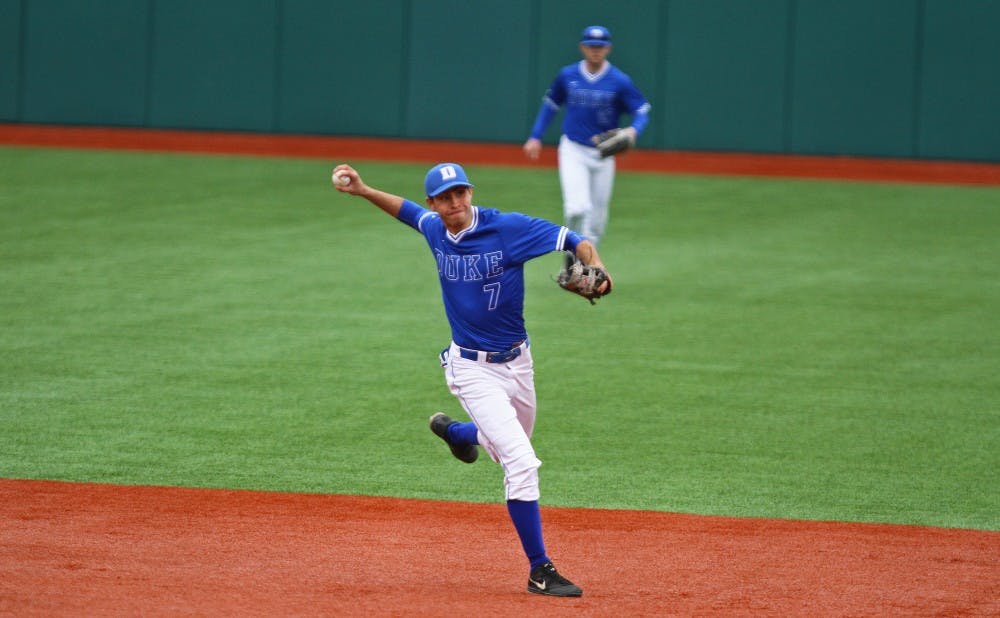Two-way players in sports don't come along often, especially in baseball. The best players in Little League will play both pitcher and shortstop, but the versatility required to do so at the college or professional level is exceedingly rare in an age of increasing specialization. Even more infrequent is the player who can not only take the field at two of the game’s most critical positions, but excel at each.
The Blue Devils have all that with junior Kenny Koplove—their shortstop who now doubles as a shutdown closer.
Koplove spent his first two seasons in a Duke uniform as the starting shortstop, winning the job early in his freshman campaign and gaining the support of the coaching staff with his slick fielding and infectious winning attitude. He came to Durham with intentions of contributing on the mound—as a senior in high school, he posted a 9-1 ledger with a 2.06 ERA and 80 strikeouts in just 48 innings—but head coach Chris Pollard thought handling the rigors of being an ACC shortstop was plenty to pile on the plate of an inexperienced freshman.
During Koplove’s sophomore season, the Blue Devil pitching staff was full with a stable of veteran arms and an established senior in Robert Huber occupying the closer’s role. But toward the end of the year—a tough one for Koplove in which he batted just .191 at the plate—he started to get the itch to get back on the mound again. With Huber and his 10 saves set to graduate—he now plays in the Oakland Athletics’ minor league system—a vacancy opened up that needed to be filled and Koplove had his opportunity to pitch again.
All he had to do was ask.
“He came to us at the end of the spring in his exit meeting and said, ‘Coach, I want to pitch again next year,’” Pollard said. “The way he’s gone about his business in our program, he had earned the right for me to say, ‘Okay, well we’ll give you another shot there.’”
Pitching, in a sense, is in Koplove’s blood. His older brother, Mike, was a relief pitcher for the Arizona Diamondbacks and Cleveland Indians from 2001-07, hurling more than 250 major-league innings as a sidearming right-hander. Mike—who holds a 17-year age advantage on Kenny—also earned a bronze medal with the U.S. Olympic team in the 2008 Beijing games after his days in the majors had ended.
The younger Koplove can recall exactly where he was when Mike first got called up to the big leagues—at an Olive Garden with his family, and the seven-year-old Kenny was upset he didn’t get to finish his meal. That same season Mike was called up, the Diamondbacks defeated the New York Yankees in the World Series, and Kenny points to watching that postseason run as the event that sparked his passion for baseball.
Mike Koplove now works as a scout for the Los Angeles Angels of Anaheim and although his playing days may be finished, he was still there to help his brother make the most out of his remaining time on the diamond. The Koploves have nearly identical pitching motions—taught to them by their father, Steve—that have them dropping down and throwing from a different angle than most batters are used to seeing.
The ability to throw from unconventional arm slots has helped the 6-foot-2, 170-pound Kenny Koplove deal with the myriad of plays and throws required of a shortstop, but getting back on the mound required an adjustment, reverting to a more traditional, over-the-top pitching style.
“When I was home in the offseason, I worked with [Mike] maybe two or three times a week with pitching, trying to just make my mechanics more sound, pick his brain on how he pitched,” Koplove said. “I never really did that—he was playing when I was playing. We were in contact constantly, but we never talked about baseball—we got enough of that on our own ends. Now that he’s done and he’s on the outside, he’s really helped me in all aspects of baseball: mentally, how to pitch, how to approach pitching, an offensive approach. He’s really helped me in that way, saying to get in the mind of the pitcher, look for tendencies, that kind of stuff.”
Koplove’s performance in his return to the mound this season would be impressive if he had taken only a few days off, let alone a few years. The Philadelphia native has proven to be a late-game asset for Pollard and the Blue Devils, notching a pair of saves and earning a win in the squad’s nonconference action. His .306 batting average and team-leading .435 on-base percentage is evidence that Koplove’s all-around game has taken a leap forward in his junior season, and that all those offseason sessions with his brother have paid off.
Most impressive is the number of hits he’s allowed to opposing batters: zero, to go along with 13 punchouts in 6.2 innings. Pollard said he isn’t surprised with Koplove’s success, noting that he exhibited the same level of dominance going back to preseason workouts.
At some point, Koplove will give up a hit, and will probably allow a run, too. But for now, he’s making college baseball look like Little League again, and having just as much fun as he did back then.
“He would be on a baseball field 365 days a year if you let him. He loves being around it, he loves working at it,” Pollard said. "It sounds like a cliché but with Kenny, it’s not: he loves playing the game more than any player I’ve ever coached. Whether it’s shortstop or on the mound or when he gets in there to hit, he just likes playing the game of baseball and really relishes the opportunity to compete.
Get The Chronicle straight to your inbox
Sign up for our weekly newsletter. Cancel at any time.

